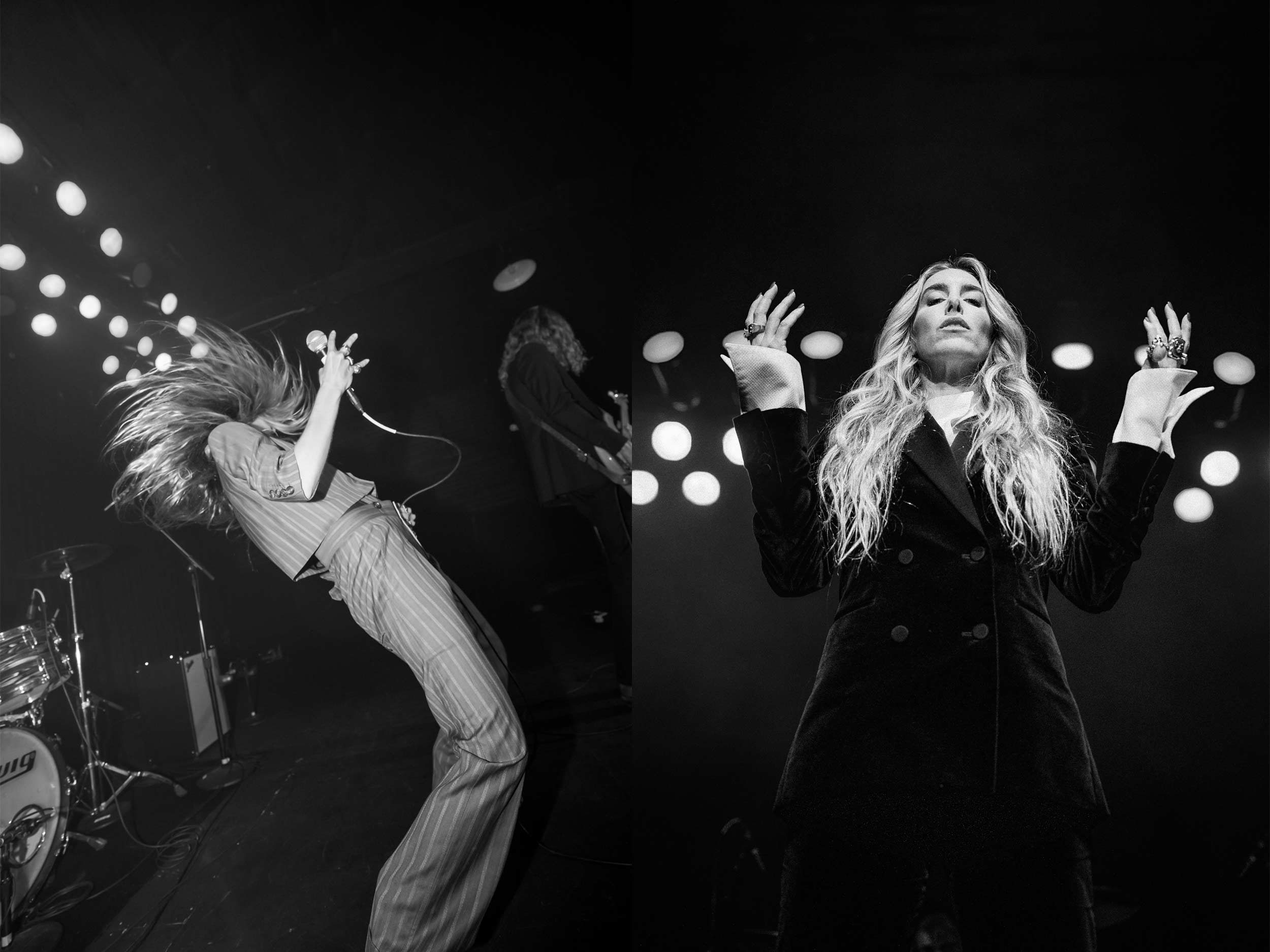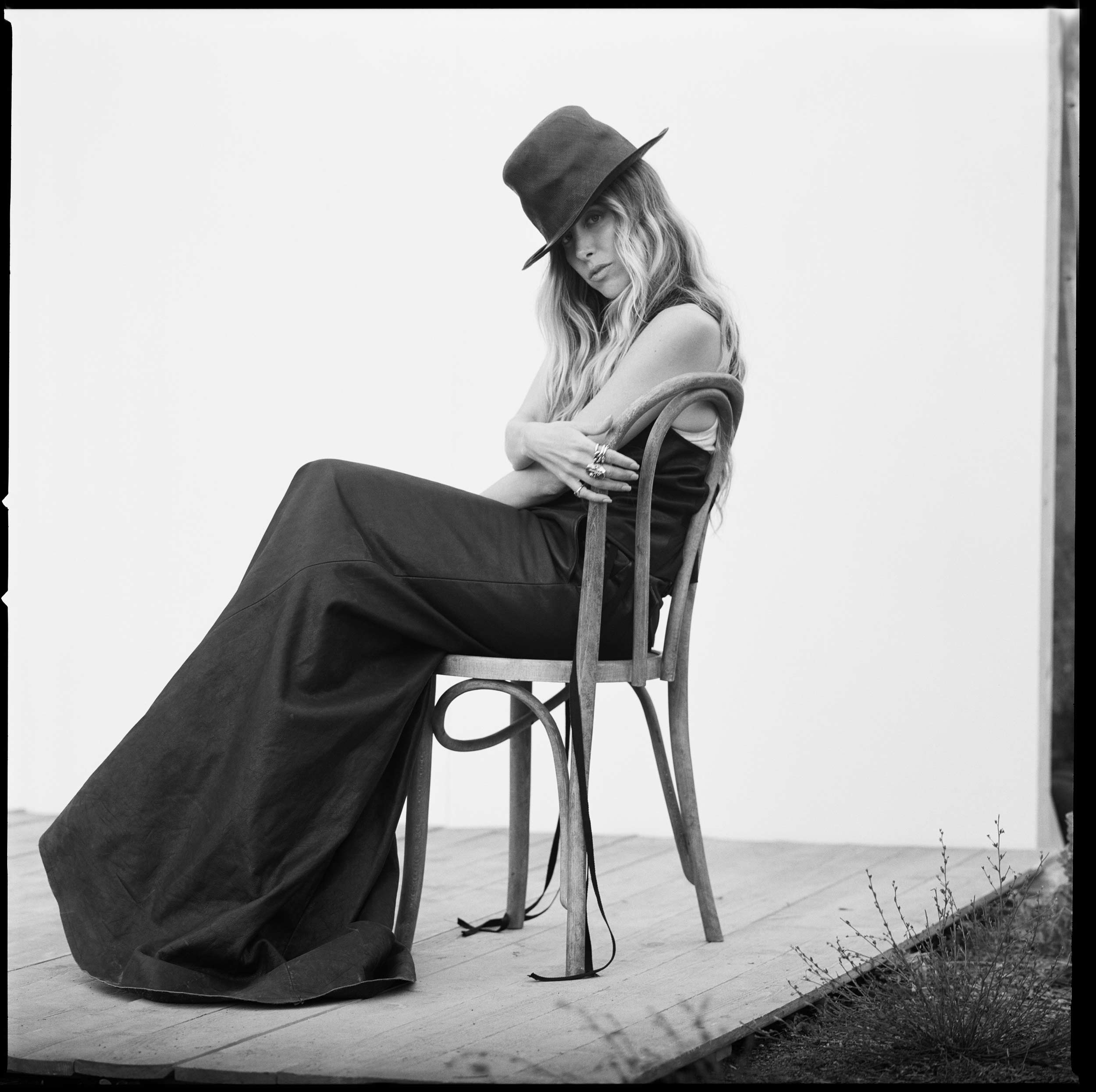The LA-based singer-songwriter introduces ‘Traveler,’ employing mighty vocals to distill the emotion of starting anew
Miss Velvet’s music isn’t made to fill a gap. “It’s more like the portal I purposely go through to evolve, to touch people,” the LA-based songstress tells Document, “to give something to others who may stumble across it.” Written alongside producer Esjay Jones, her latest album Traveler diaries an era of change: a move to the West Coast, the birth of a second child, a return to classic rock and roll. Miss Velvet started as an alter ego; as of today, the artist and the persona are one and the same.
Traveler—set to release tomorrow—is inspired by greats like Patti Smith, Janis Joplin, Robert Plant, Stevie Nicks. Miss Velvet, a vocalist at heart, soars over electric guitar and drum-heavy tracks; it’s the type of heart-thumping sound rarely reaching the mainstream today, particularly when it comes to women artists. “I feel a shift,” she says. “It’s almost as if rock is trickling back into the zeitgeist, but it’s happening like a slow tsunami. The power is gathering from wide out and, at some point, will reach its super-height and crash upon us… The younger generation is discovering the beauty for the first time.”
Just ahead of the much-anticipated launch, Document caught up with Miss Velvet—talking Helmut Newton, Led Zeppelin, and California’s legacy of rock and roll.
Nick Vogelson: What women in rock inspired you to start making music?
Miss Velvet: There are a few biggies. Janis Joplin for her raw, unapologetic voice. The boundaries that she pushed were monumental; it took such guts to just hold true to her voice. Patti Smith for her storytelling. The poetic fierceness she so boldly gave. A big moment for me was her record Horses with the iconic cover by Robert Mapplethorpe. That calmness and badass nature she exudes just makes you stop. She defined a movement of female rockers. Stevie Nicks, for her brilliant way of telling a story in a song—[you feel] like you can totally relate. One of the greatest songwriters to ever do it.
Nick: Are there any iconic moments in fashion or music that have inspired your style?
Miss Velvet: There is a photograph by Helmet Newton called Le Smoking. It’s a woman shot in Paris in 1975 in a Yves Saint Laurent suit. There is something about the androgynous nature and elegant power that oozes from that image. For me, the sexuality is not thrown in your face by a lack of clothes—it’s even stronger that this woman is in a suit, owning her body and strength.
For this evolution of Miss Velvet, I felt stronger than ever [in redefining] what rock and roll means to me. This image kept circling back in my mind as I was writing my album, pregnant with my second girl—but I didn’t know why! When it was time to put visuals with the music I finally had a light-bulb moment. I remember looking in my closet, about to shoot a music video, and I saw this Vivienne Westwood suit. I remember, at that exact moment, the hair on my arm stood up. I said, That’s it.
Nick: Musicians are all about influence. What’s the most important album to you?
Miss Velvet: Led Zeppelin IV made its mark on me. Every time I listen to the masterful beauty of this record, it shows me something different. I almost feel as though it grows with me: the fearless tempo changes, the cohesive yet jarring sonic energy, the articulation of the musicality, and, of course, the vocals of Robert Plant. As a vocalist, I connect so deeply with the way Plant unleashes these siren-like sounds of pure electricity—yet at the same time, bringing you to the quietest of places with his storytelling. Every time I was unsure of my voice, I listened to this record. No fear.
Nick: What is your opinion on the current moment in rock?
Miss Velvet: I feel a shift, especially for women. It’s almost as if rock is trickling back into the zeitgeist, but it’s happening like a slow tsunami. The power is gathering from wide out and, at some point, will reach its super-height and crash upon us—in a good way. I think the coolest part is you have some artists tapping back into the classic rock scene, such as Greta Van Fleet. You have these big legacy acts like Stevie Nicks, the Rolling Stones, heading back on tour, and the younger generation is discovering the beauty for the first time.
“It’s almost as if rock is trickling back into the zeitgeist, but it’s happening like a slow tsunami. The power is gathering from wide out and, at some point, will reach its super-height and crash upon us—in a good way.”
Nick: On to your album: Which song feels the most personal?
Miss Velvet: The title track ‘Traveler’ feels like a super vulnerable yet hopeful journal entry. That song really embodies the spirit of where I am as an artist and a young mother. The line [about being] a ‘traveler of possibilities’ is about coming out to Cali post-pandemic, a band break-up, a new marriage, being pregnant with another baby, and having the faith that I could start anew. [It means] taking all my travels and experiences and mistakes, owning them, growing with them, and ultimately setting them free.
Nick: What was going on in your life when you recorded this album?
Miss Velvet: When my songwriting partner and producer Esjay Jones and I met, I had just found out that I was pregnant again. It came as a total surprise. Something in my voice definitely shifted—it was richer and more earthy. Once we listened back to some of the demos, we knew that the lyrics and the sonic landscapes needed to become more grand. The voice was presenting this new tone that we both fell in love with. It honestly catapulted the way we were going to approach the record.
Nick: Do you feel like your music exists to fill a gap?
Miss Velvet: It’s more like the portal I purposely go through to evolve, to touch people—to give something to others who may stumble across it. And overall, for me to explore the creative possibilities of human life.
Nick: California has such a history of rock. Do you feel like LA has a presence in the album?
Miss Velvet: There’s a book by Barney Hoskyns titled Hotel California about the very unique history you refer to. He uses a quote by the Eagles: ‘There is no more new frontier / We have got to make it here.’ The California music scene of the ’60s and ’70s—where David Crosby, Stephen Stills, Graham Nash, Neil Young, Joni Mitchell and so many others gave birth to now-iconic works—fascinated me. I imagined the scene, the culture, the rebel vibes, motorcycles on the PCH, spectacular nature. It all seemed melded to a magic place of wild expression to this city girl. When I made the exodus from NYC’s canyons of steel to the actual canyons, I felt the spirit immediately. It was like the myths in my mind came alive.
In Traveler, California has a huge, emotional, psychic, spiritual presence. You can read it in the lyrics and hear it in the sonic style. For example, the track ‘Zumirez’ is quite literally about my calling to go West, so to speak—and since then, the freedom of expression and sense of home the environment gives me is a gift for which I’m truly grateful.
“When I made the exodus from NYC’s canyons of steel to the actual canyons, I felt the spirit immediately. It was like the myths in my mind came alive.”
Nick: Tell us about the recording process; who were the key players?
Miss Velvet: The first part of this process was finding a producer I could connect to. My manager reached out to Esjay Jones, a South African rock and roll producer now based in Cali, out in Joshua Tree. I found this deep kindred spirit in this human that I had not felt before in music. She was not afraid to write songs that touched on what was currently happening to me—the good, the bad, and the ugly. She actually moved in with me during the writing process, which grew into a deeper understanding of the topics I wanted to touch upon.
Once we had the bulk of the record done, she brought amazing musicians into the Velvet world, such as Terry Corso from Alien Ant Farm and Ben Young, a great guitarist in the LA scene. When it came time to record, we reached out to Kemble Walters, guitarist for Juliet and the Licks and Chevelle. For keys, Nick Milo, who used to play for Joe Cocker. And Blair Sinta, who was touring and studio drummer for Stevie Nicks, Annie Lennox, and Alanis Morissette. Having these musicians really dig what we were doing was so special. The collaborative process of making a record is truly a joy to witness. You never know when the muse will come down.
Nick: How important is personal style to performance?
Miss Velvet: Over the years I’ve been professionally singing, the aesthetic of my alter ego, Miss Velvet, has evolved. Now, we are almost one and the same—and by that I mean we’ve fully-integrated the conception and the songs themselves. When demo-ing a song, I simultaneously envision how it would feel onstage, how it would move. With this album, I can say that if there was a gap between the woman and the performer before, my personal evolution has closed it. How I felt creating these songs is what I’m bringing to the stage.









